"The War of the Worlds" was a Halloween episode of the radio series The Mercury Theatre on the Air directed and narrated by Orson Welles as an adaptation of H. G. Wells's novel The War of the Worlds (1898). It was performed and broadcast live at 8 pm ET on October 30, 1938 over the CBS Radio Network. The episode is famous for inciting a panic by convincing some members of the listening audience that a Martian invasion was taking place, though the scale of panic is disputed, as the program had relatively few listeners.
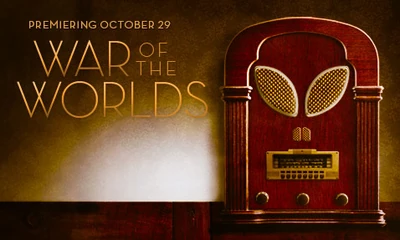
Orson Welles' War of the Worlds Poster
Plot[]
Astronomers report seeing several large explosions of incondecent gas on the surface of the planet Mars. A large meteor is then described to have landed somewhere in the New Jersey farmland. A cylinder, which is thought to have been said meteor, was found on Grover's Mill, New Jersey. The cylinder is almost identical to that of the novel being 30 yards in diameter and a yellow hue. The top end of the cylinder begins to unscrew, and when it comes off a martian appears above the rim. A policeman approaches the martian with a white handkerchief in his hand, to show the humans were friendly. This is when the heat ray appears and kills at least 40 people.
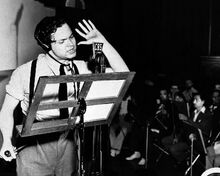
Orson Welles broadcasting The War Of The Worlds
The military is sent in to destroy the cylinder but a Martian Fighting Machine rises out of the cylinder, burning or crushing over five-thousand soldiers. The Martians advance eastward, cutting down bridges and power lines in their track.
An artillery unit comes into combat with some Fighting Machines but are killed quickly after they suffocate in the Black Smoke. A B-17 Bomber, which replaces the HMS Thunder Child in this story, is used to bomb the Tripods but is struck with the Heatray but crashes into a fighting machine.
The Martians continue north until they reach New York City. It is here when the 'radio part' of the broadcast ends. The Martians use black smoke on the fleeing population, this is what kills the broadcaster.
The second part of the story includes Proffesor Pearson hiding in a house and after watching the martians outside his window he ventures out, into the city. Here he finds a slightly crazy soldier (The Artillary man) who describes his dream of living underground. The Proffesor then leaves this man and wonders into the city.
He discovers the martians dead. Killed by bacteria. Black birds eating their bodies.
Production[]
H. G. Wells's original novel tells the story of a Martian invasion of Earth. The novel was adapted by Howard E. Kochfor the 17th episode of the CBS Radio series The Mercury Theatre on the Air, broadcast at 8 pm ET on Sunday, October 30, 1938.[2]:390, 394 The program's format was a simulated live newscast of developing events. The setting was switched from 19th-century England to contemporary Grover's Mill, an unincorporated village in West Windsor Township, New Jersey, in the United States.
The first two-thirds of the hour-long play is a contemporary retelling of events of the novel, presented as news bulletins interrupting another program. "I had conceived the idea of doing a radio broadcast in such a manner that a crisis would actually seem to be happening," Welles later said, "and would be broadcast in such a dramatized form as to appear to be a real event taking place at that time, rather than a mere radio play.[5] This approach was similar to Ronald Knox's radio hoax Broadcasting the Barricades, about a riot overtaking London, that was broadcast by the BBC in 1926,[6][7] which Welles later said gave him
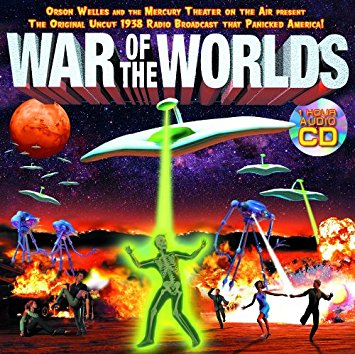
The Poster
the idea for "The War of the Worlds".[8] A 1927 drama aired by Adelaide station 5CL depicted an invasion of Australia via the same techniques and inspired reactions similar to those of the Welles broadcast.[9]
He was also influenced by the Columbia Workshop presentations "The Fall of the City", a 1937 radio play in which Welles played the role of an omniscient announcer, and "Air Raid", a vibrant as-it-happens drama starring Ray Collins that aired October 27, 1938.[10]:159, 165–166 Welles had previously used a newscast format for "Julius Caesar" (September 11, 1938), with H. V. Kaltenborn providing historical commentary throughout the story.[11]:93
"The War of the Worlds" broadcast used techniques similar to those of The March of Time, the CBS news documentary and dramatization radio series.[12] Welles was a member of the program's regular cast, having first performed on The March of Time in March 1935.[1]:74, 333 The Mercury Theatre on the Air and The March of Timeshared many cast members, as well as sound effects chief Ora D. Nichols.[4]:41, 61, 63
Welles discussed his fake newscast idea with producer John Houseman and assistant director Paul Stewart; together, they decided to adapt a work of science fiction. They considered adapting M. P. Shiel's The Purple Cloud and Arthur Conan Doyle's The Lost World before purchasing the radio rights to The War of the Worlds. Houseman later wrote that he suspected Welles had never read it.[2]:392[4]:45[5][a]
Howard Koch had written the first drafts for the Mercury Theatre broadcasts "Hell on Ice" (October 9), "Seventeen" (October 16),[10]:164 and "Around the World in 80 Days" (October 23).[11]:92 Monday, October 24, he was assigned to rescript "The War of the Worlds" for broadcast the following Sunday night.[10]:164
Tuesday night, 36 hours before rehearsals were to begin, Koch telephoned Houseman in what the producer characterized as "deep distress". Koch said he could not make The War of the Worlds interesting or credible as a radio play, a conviction echoed by his secretary Anne Froelick, a typist and aspiring writer whom Houseman had hired to assist him. With only his own abandoned script for Lorna Doone to fall back on, Houseman told Koch to continue adapting the Wells fantasy. He joined Koch and Froelick and they worked on the script throughout the night. On Wednesday night, the first draft was finished on schedule.[2]:392–393
On Thursday, associate producer Paul Stewart held a cast reading of the script, with Koch and Houseman making necessary changes. That afternoon, Stewart made an acetate recording, with no music or sound effects. Welles, immersed in rehearsing the Mercury stage production of Danton's Death scheduled to open the following week, played the record at an editorial meeting that night in his suite at the St. Regis Hotel. After hearing "Air Raid" on the Columbia Workshop earlier that same evening, Welles viewed the script as dull. He stressed the importance of inserting news flashes and eyewitness accounts into the script to create a sense of urgency and excitement.[10]:166
Houseman, Koch, and Stewart reworked the script that night,[2]:393 increasing the number of news bulletins
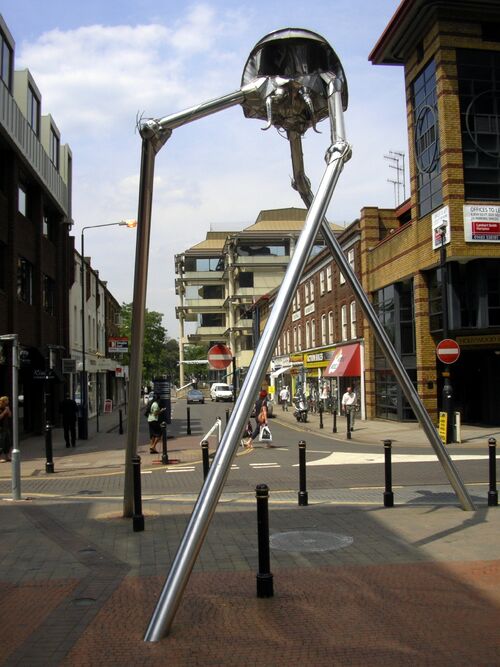
Fighting Machine Statue
and using the names of real places and people whenever possible. Friday afternoon, the script was sent to Davidson Taylor, executive producer for CBS, and the network legal department. Their response was that the script was 'too' credible and its realism had to be toned down. As using the names of actual institutions could be actionable, CBS insisted upon some 28 changes in phrasing.[10]:167
Under protest and with a deep sense of grievance we changed the Hotel Biltmore to a nonexistent Park Plaza, Trans-America to Inter-Continent, the Columbia Broadcasting Building to Broadcasting Building," Houseman wrote.[2]:393 "The United States Weather Bureau in Washington, D.C." was changed to "The Government Weather Bureau", "Princeton University Observatory" to "Princeton Observatory", "McGill University" in Montreal to "Macmillan University" in Toronto, "New Jersey National Guard" to "State Militia", "United States Signal Corps" to "Signal Corps", "Langley Field" to "Langham Field", and "St. Patrick's Cathedral" to "the cathedral".[10]:167
Full Plot[]
"The War of the Worlds" begins with a paraphrase of the beginning of the novel, updated to contemporary times. The announcer introduces Orson Welles: We know now that in the early years of the 20th century, this world was being watched closely by intelligences greater than man's and yet as mortal as his own. We know now that as human beings busied themselves about their various concerns, they were scrutinized and studied, perhaps almost as narrowly as a man with a microscope might scrutinize the transient creatures that swarm and multiply in a drop of water. With infinite complacence, people went to and fro over the earth about their little affairs, serene in the assurance of their dominion over this small spinning fragment of solar driftwood which by chance or design man has inherited out of the dark mystery of Time and Space. Yet across an immense ethereal gulf, minds that are to our minds as ours are to the beasts in the jungle, intellects vast, cool and unsympathetic, regarded this earth with envious eyes and slowly and surely drew their plans against us. In the 39th year of the 20th century came the great disillusionment. It was near the end of October. Business was better. The war scare was over. More men were back at work. Sales were picking up. On this particular evening, October 30th, the Crossley service estimated that 32 million people were listening in on radios…[2]:394–395[20]
The program continues with a weather report and an ordinary dance band remote featuring "Ramon Raquello and His Orchestra", interrupted by news flashes about strange explosions on Mars. An interview is arranged with reporter Carl Phillips and Princeton-based Professor of Astronomy Richard Pierson, who dismisses speculation about life on Mars. The news grows more frequent and increasingly ominous as a cylindrical meteorite lands in Grover's Mill, New Jersey. A crowd gathers at the site, where Phillips and Pierson relate the events. The cylinder unscrews, and onlookers catch a glimpse of a tentacled, pulsating, barely mobile Martian inside before it incinerates the crowd with heat-rays. Phillips's shouts about incoming flames are cut off mid-sentence.
Regular programming breaks down as the studio struggles with casualty and fire-fighting updates. A shaken Pierson speculates about Martian technology. The New Jersey state militia declares martial law and attacks the cylinder; a captain from their field headquarters lectures about the overwhelming force of properly equipped infantry and the helplessness of the Martians, until a tripod rises from the pit. The tripod obliterates the militia, and the studio returns, now describing the Martians as an invading army. Emergency response bulletins give way to damage and evacuation reports as thousands of refugees clog the roads. Three Martian tripods from the cylinder destroy power stations and uproot bridges and railroads, reinforced by three others from a second cylinder that landed in the Great Swamp near Morristown, as gas explosions continue. The Secretary of the Interior addresses the nation.
A live connection is established to a field artillery battery in the Watchung Mountains. Its gun crew damages a machine, resulting in a release of black smoke, before fading into the sound of coughing. The lead plane of a wing of bombers from Langham Field broadcasts its approach and remains on the air as their engines are burned by the heat-ray and the plane dives on the invaders. Radio operators go active and fall silent – although the bombers destroyed one machine, the remaining five are spreading black smoke across the Jersey Marshes into Newark.
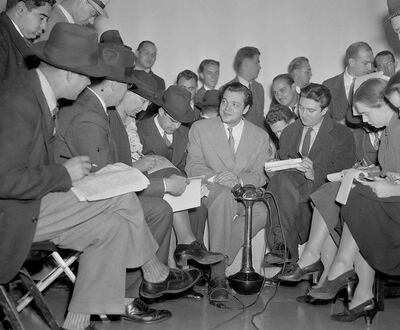
Interview
Eventually, a news reporter, broadcasting from atop the Broadcasting Building, describes the Martian invasion of New York City – "five great machines" wading the Hudson "like [men] wading through a brook", black smoke drifting over the city, people diving into the East River "like rats", others in Times Square "falling like flies". He reads a final bulletin stating that Martian cylinders have fallen all over the country, and is eventually killed by the smoke. Finally, a ham radio operator is heard calling, "2X2L calling CQ, New York. Isn't there anyone on the air? Isn't there anyone on the air? Isn't there... anyone?"
After a period of silence comes the voice of announcer Dan Seymour:
You are listening to a CBS presentation of Orson Welles and the Mercury Theatre of the Air, in an original dramatization of The War of the Worlds by H. G. Wells. The performance will continue after a brief intermission.
The last third of the program is a monologue and dialogue. Professor Pierson, having survived the attack on Grover's Mill, attempts to make contact with other humans. In Newark, he encounters an opportunistic militiaman who holds fascist ideals in regards to man's relationship with the Martians, and intends to use Martian weaponry to take control of both species. Declaring that he wants no part of "his world", Pierson leaves the stranger with his delusions. His journey takes him to the ruins of New York, where he discovers that the Martians have died – as with the novel, they fell victim to earthly pathogenic germs, to which they had no immunity. Life eventually returns to normal, and Pierson finishes writing his recollections of the invasion and its aftermath.
The Panic and Reaction[]
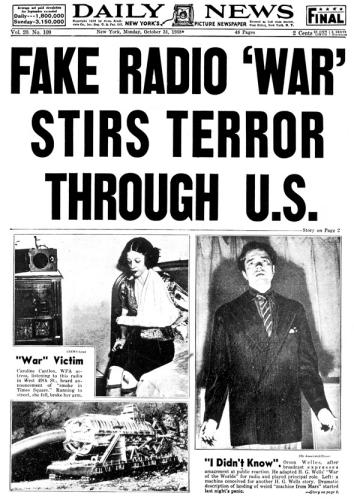
A Front page of a newspaper following the broadcast
The War of the Worlds Radio broadcast was aired on October 30th, 1938. It began at 8:00 pm. Because of the play being acted like a series of News Bullitens, Orson annouced at the begining "The following may contain scenes with realistic content, but all viewers need to know, everything will you hear is completley fictional." Thousands of people who heard this annoucment or learned about the play being aired through newspaper articles, listened to the play, and loved it!
Unfortunately, what Orson didn't count on was people tuning into the broadcast at the wrong time. Thousands of people who hadn't heard of the play, did not hear the announcment, or even heard about the original book, turned on their radios to CBS, to hear the interuptions, and have no idea that these were fictional.
Timeline of the Panic[]
(Remember, everything that is announced on the radio is fake, so people are panicking over nothing)
The first interruption stirred concern and intrest. It claimed that plasma explosions were occuring on the planet mars, and shooting green beams of light toward Earth.
The second interruption increased the tension. It claimed a plasma beam had crashlanded on Earth, at Grovers Mill, New Jersey.
The thrid interruption began to scare people, when fictional reporter Carl Phillips reported, with a giant crowd, at the crash site, and told the viewers that the object was no meteor, it was large cylinder. Listners soon got the scare of their lives, when it was reported, that the lid of cylinder, unscrewed and fell off, revealing the Martians, that were described to have a terrifying apperance of a squid with snake-like tentacles. Worse, the scare of the night began, when it was reported that the Martians activated their first weapon, the Heat Ray, and used it to blow up the innocent crowd and the field with flames. Suddenly the radio cut out, and the announcer said they were having techincal difficulties, leaving listeners frozen with fear and shock.
The fourth interruption announced that hundreds of people, including Carl Phillps lay dead, burned up by the Martian´s heat ray. Listeners were terrified, thinking that the horrible massacre they had just heard about was actually happening.
The fifth interruption announced that the millitary was heading to New Jersey to kill the Martians. This left many listeners relieved, thinking that they would destroy the Martians. But terror soon rose again when the battle began, and the Martians revealed their main weapon. The Fighting Machines, 300 ft tripods that stood up, and used heat rays, and crushing legs to destroy the millitary. Worse, instead of being shot down, the Fighting Machines put out an electromagnetic force shield, that stopped all the firing weapons from destroying it. Listeners began to get frantic, thinking the events were still true, and assuming that the Fighting Machines were invincible, and they would destroy anything.
The sixth interruption reprted that 7,000 millitary officials were killed, and all of the tanks, cannons, etc were blown up. They then claimed that based off the evidence of the plasma explosions and the cylinder the strange creatures must be an invading army from Mars, that has come to take over our planet.
With these words, the listeners were convinced that a devestating invasion from Mars had started, and the panic begun. Families stashed up all their food, got a shotgun or any weapons they could find, got board games for entertainment, and the radio, and cowered in the basement.
Other listeners, who were closer to Grover´s Mill, packed up all their things into their cars, and fled America. During the fleeing, many cars accidently crashed into each other, and many people were killed or injured.
More people ran from house to house shouting that Martians were destroying the world, and The End of The World had begun. People also called the police, and they had no idea of the events that were going on.
The seventh interruption stirred up more chaos, when reports of a second cylinder crashed into Jersey Marshes of Newmark. The millitary then advanced to destroy the cylinder before the Martians got out.
Now, people in Newmark began to flee too, and some even fled to Canada.
The Eigth interruption caused chaos in a small town, when a report from the cockpit of a B14 Bomber said that the Fighting Machines were currently destroying the city of Trenton. People in Trenton began to panic, and stampede through the streets in blind terror. Shops and buisness were looted by rioters, and cars were stolen by people desperate to get away. Soon, a large light lit up over the city, and people began to go crazy. People hugged and cowered, thinking that it would see the Martian Fighting Machines, and the be blown up by their heat rays. However, the large light was only coming from a seachlight, on top of a police car. A police officer was shouting, ¨Stop Panicking Now! Stop rioting or your under arrest!! Listen! There is no invasion from Mars!! There is no Tripods with Heat Rays!! It is just a radio play by CBS! Repeat, there is no invasion from Mars! It is just a radio play!¨ People stopped panicking, and their feelings of fear and panic was replaced with feelings of embarssement, stupidity, remorse, and relief. Other people who thought they would be seeing the fighting machines were confused, not knowing where they were. They soon learned the truth, and felt silly. Trenton was one of the first towns to be convinced that their was no invasion from Mars, though their will still thousands were still convinced.
The Ninth interruption was from the B14 Bomber, and other planes were convirging on the Fighting Machines too, but they were soon all downed by the Heat Ray. However, an accidental crash between a plane and a Fighting Machine without the force field managed to destroy the machine.
The 10th interruption announced the battle at the second cylinder had begun. The Fighting Machines and the Heat Rays rose out of the cylinder, as the millitary began to attack. But, instead of using the heat ray, the Martians reveal a new weapon. The black smoke. They Martians launched balls of black smoke into the army, and the smoke grows bigger and bigger and bigger. The soilders put on their gas masks, but just like the force field, the black smoke penetrated through the gas masks, and suffocated all the soilders to death. The reports then went up when that the Martians were heading towards, New York City, and people were fleeing.
However, listeners who heard about the Martians heading towards New York City, began to flee in real life. Looting began, people croweded the subway stations, and gun shops were filled with customers looking to defend themselves. Police lines were still full. Terrified Listeners were calling for help, thinking that the world was going to die. The officers all said the same thing.
¨There is no danger. What you have heard is fake. It´s just a radio play. There is no invasion from Mars.¨
Drastic things began happening to the people who were convinced. People were arrested by police, for causing panic in communities, by pulling out guns and shooting at Water Towers, which looked to them like the Alien Tripods. People were also arrested for rioting, reckless driving, robbery, and even assault. Fires had started by rioters, or by accidental mistakes during the panic. What was worst of all, was over 50 people commited suicide, 40 suffered heart attacks, and 20 began to get hysterical because they were so panicked by the broadcast.
The most chaotic part of the night happened at the 11th interruption. When reporting from the evacuations in New York, an entire army of 22 Fighting Machines rose up out of the Hudson River, and Jumped onto George Washington Bridge. More reports said that 14 more Fighting Machines jumped out of the East River and onto the Brooklyn Bridge. All the tripods then marched into the city, and began going on a rampage. They destroyed buildings with their heat rays, massive tentacles and legs, crushed and blew up cars, people panicked throughout the streets, running away from the evil Monsters, and humans were either burned up or abducted. The NYPD shoots at the Fighting Machines, to no avial. The fatal moment came, when all the machines launched black smoke into the city, and the rest of manhattan was flooded with the nasty chemical, killing almost everybody in the city. The announcer is killed too, and his last words were¨2x2l calling CQ. 2x2l calling CQ! 2x2l calling CQ! Please! Is their anyone on the air?..............Anyone?¨ And this marked the end of Part 1.
In real life, things in downtown New York City were disasterous. Terrified people stamped through the streets, thinking the Martians were going to kill them. Cars crashed! Shops were looted! People were trampled to death! However, people realized their comon sense, when some looked out to the Brooklyn and George Washington bridges at the time the Martians were reported to be on them. Their were no Martians. Some assumed they already went into the city, while others realized the entire broadcast was a fake. People also realized their common sense to, when they saw no explosions, building collapses, or black smoke. People who were waiting to die at the black smoke were confused when nothing came. Then, the radio said, ¨This concludes part 1 of The War of The Worlds radio broadcast. For those of you who are tuning in now, the War of The Worlds is a book by H.G Wells, that tells the story of evil martians coming to take over Earth to steal our natural resouces. We will be back after these messages for part 2.
At this point, all of the people in New York, and half of the people had taken the broadcast for being real, realized that they had been wrong the whole time. Their was no danger. They panicked over nothing, over less then nothing. They panicked over a radio play.
Part 2 of The War of The Worlds began, and it was different than the first part. Instead of being in the form of a News Bulliten, its the diary entry´s of one of the last people alive after the Martians invasion and he explained how the world had changed, and how the Martians were defeated by Viruses.
Some Listeners heard this, and realized it was a play. While others had already fled. One couple fled from Texas to the Redwood Forest, and didn´t stop driving until they ran out of gas. In Washington DC, the president, who had heard of the events, was trying to contact CBS, to tell them to stop the broadcast. He also adressed to the people of Washington DC that it was just a radio play. Many people did not believe him, because during the broadcast, Orson Welles did the best inpersonation of him, telling that America was now going to War against the Martians. They then believed him when he said that it was not him who said that.
At the end of the broadcast, the panic finally came to an end, when Orson Welles adressed to the nation that it was just a play. He said "This is Orson Welles, ladies and gentlemen, out of character, to assure you that The War of the Worlds has no further significance than as the holiday offering it was intended to be; The Mercury Theatre's own radio version of dressing up in a sheet and jumping out of a bush and saying "Boo!" Starting now, we couldn't soap all your windows and steal all your garden gates by tomorrow night, so we did the next best thing. We annihilated the world before your very ears and utterly destroyed the CBS. You will be relieved, I hope, to learn that we didn't mean it, and that both institutions are still open for business. So goodbye everybody, and remember please for the next day or so the terrible lesson you learned tonight. That grinning, glowing, globular invader of your living room is an inhabitant of the pumpkin patch, and if your doorbell rings and nobody's there, that was no Martian, it's Halloween."
This marked the end of the panic, when all of the people who had been duped realized that their was no invasion from Mars, and all that pent up fear, panic, and chaos was all for nothing.
Aftermath
The following hours for CBS was a nightmare. Police entered the studio, saying that people all over the U.S panicked over the broadcast. Orson Welles feared at that very moment, that he and all the Mercury Theater actors were going to Prison. However, Orson honestly told the police that he had no intention to cause panic, and he had announced at the begging that it was only play. Orson felt guilty of scaring everybody, but he also felt proud that he had pulled off the biggest moment in his carrer so far. It was actually the start of him becoming one of the most famous actors in American history.
Many letters arrived to CBS over the Next week. Many of them congratualted the broadcast for pulling off an amazing story and making The War of The Worlds story now famous in America. Other letters unfortunatley were furious, and told CBS that it was a horrible joke to play on the innocent, and it was the most terrifying night of their lives.
H.G. Wells had even listened to the broadcast. He was happy that his story had received an adaptation, and he loved the storyline, but he also said it was not necessary to make it to realistic to scare the living daylights of out people.
The War of The Worlds book became famous throughout America. Now everybody had heard of the story, and everybody was interested to read about what scared them half to death. As for Orson Welles, he went on to star in one of the greatest movies of all time, Citizen Kaine.
Trivia[]
- There is some dispute about how big the panic was. It's possible that the newspapers exaggerated the scale of the panic.
- The number of people affected are still unknown. Between 50,000 and 600,000 are believed to have panicked, mostly in the eastern states of New Jersey and New York (which was stated in the radio where the Martians were on the offensive)
- The public's response inspired the films The Night That Panicked America and Brave New Jersey.
Full Broadcast[]
See also: Mercury Theater's The War of the Worlds Transcript.

